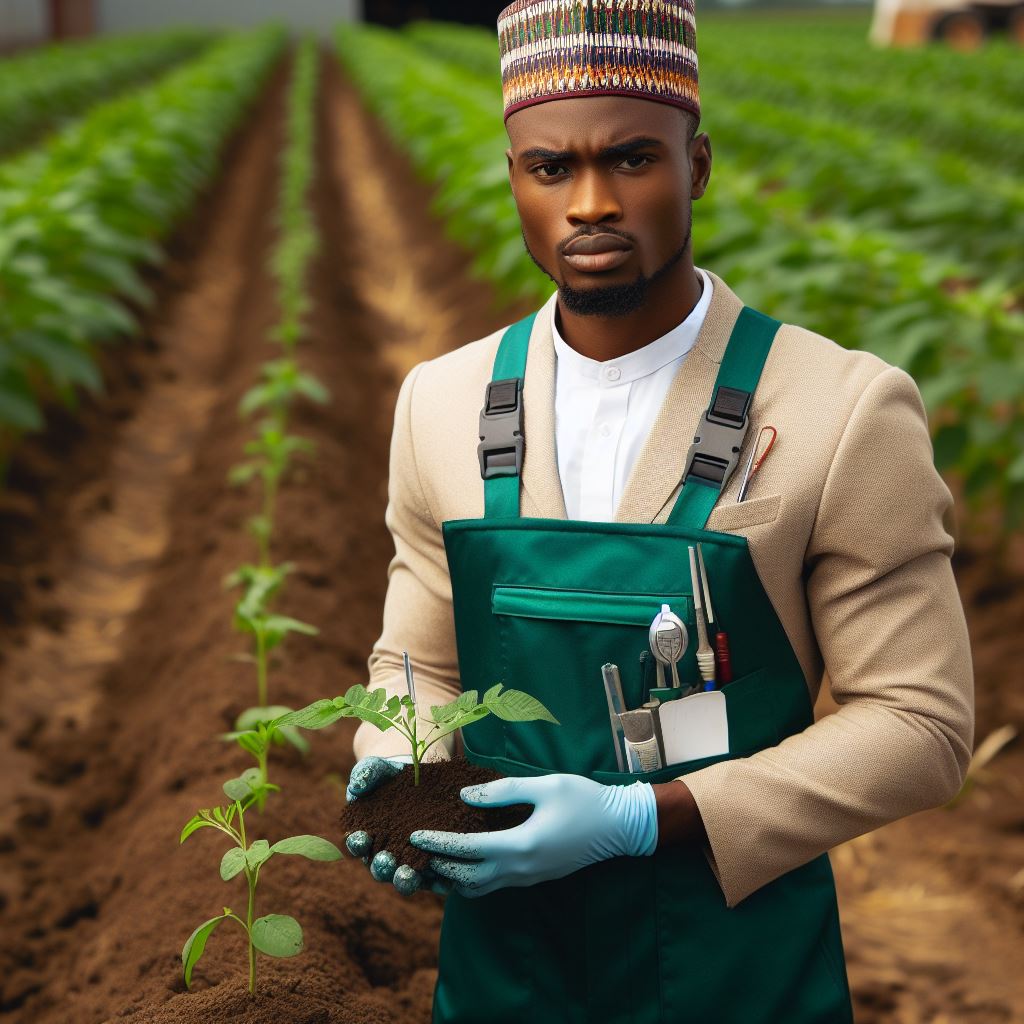Introduction
Studying crop production in Nigeria unveils an intricate narrative. Nigeria, an agrarian society, heavily relies on agriculture, making this subject indispensable.
Crop production’s study not only delves into farming techniques but also unravels the nation’s economic backbone.
Understanding Nigeria’s agricultural landscape offers insight into its socio-economic fabric.
Crop production serves as a pivotal cog in Nigeria’s economic machinery, contributing substantially to its GDP.
This sector is a major employer, supporting livelihoods across diverse communities.
The importance of studying crop production in Nigeria transcends beyond economic facets.
It encompasses food security, a pressing concern amid global challenges.
Nigeria’s burgeoning population demands sustainable agricultural practices to meet food requirements.
Exploring this field provides a lens into Nigeria’s rich agricultural heritage.
Traditional farming methods intertwined with modern innovations create a unique tapestry.
Studying crop production unravels this blend, offering a holistic view of Nigeria’s agricultural evolution.
This academic pursuit instills valuable skills, fostering innovation and problem-solving abilities.
It equips students with practical knowledge, addressing real-world agricultural challenges prevalent in Nigeria.
Such expertise is instrumental in propelling the sector forward.
Moreover, delving into crop production nurtures environmental consciousness. Sustainable farming practices are imperative to mitigate ecological impacts.
This knowledge empowers students to champion eco-friendly agricultural methodologies.
In essence, studying crop production in Nigeria isn’t merely an academic endeavor.
It’s a gateway to understanding the nation’s economy, culture, and sustainability.
By immersing in this subject, students embark on a transformative journey, poised to contribute meaningfully to Nigeria’s agricultural landscape.
Overview of Crop Production in Nigeria
Introduction to the agriculture sector in Nigeria
Nigeria has a thriving agriculture sector, which plays a significant role in its economy.
The sector employs a large percentage of the population, particularly in rural areas.
It contributes to food security, promotes rural development, and reduces the country’s reliance on food imports.
Agriculture in Nigeria is primarily practiced by small-scale farmers, with a few large commercial farms.
Crop production is a major component of the agriculture sector in Nigeria, contributing to its growth and development.
Importance of crop production in the country
- Crop production is crucial for meeting the dietary needs of the Nigerian population.
- It provides essential nutrients such as carbohydrates, proteins, vitamins, and minerals.
- Crop production also serves as a source of income for farmers, contributing to poverty reduction and economic stability.
- The sector generates employment opportunities, empowering rural communities and reducing migration to urban areas.
- Nigeria’s ability to achieve sustainable development goals depends on the success of its crop production sector.
Major crops grown in Nigeria
- Cassava: Cassava is a staple food in Nigeria and serves as a vital source of carbohydrates.
- Maize: Maize is widely cultivated in Nigeria and is used for human consumption and animal feed.
- Rice: Rice is an important food crop that plays a significant role in Nigeria’s food security initiatives.
- Yam: Yam is a popular tuber crop in Nigeria, consumed in various delicious forms.
- Beans: Beans are high in protein and are a vital source of nutrition for many Nigerians.
- Groundnut: Groundnuts are commonly grown in Nigeria and are a valuable source of oil and protein.
- Palm oil: Nigeria is one of the largest producers of palm oil in the world, contributing to the country’s economy.
- Cotton: Cotton cultivation contributes to the textile industry and provides raw materials for various products.
- Cocoa: Nigeria is known for its cocoa production, making it an essential crop for the country’s export market.
- Vegetables: A wide variety of vegetables, including tomatoes, peppers, and leafy greens, are grown in Nigeria.
Crop production in Nigeria is instrumental in ensuring food security, promoting economic growth, and improving the livelihoods of farmers.
The sector’s potential for expansion and innovation presents exciting opportunities for future agricultural advancements.
With sustained investments, supportive policies, and access to modern technologies, Nigeria can further enhance its crop production capabilities and achieve agricultural excellence.
Read: Challenges Facing Crop Science Education in Today’s Nigeria
Student Experiences in Studying Crop Production
Importance of hands-on experience for students studying agriculture
Agriculture is a fundamental sector in Nigeria, and studying crop production provides valuable insights into this industry.
For students, gaining hands-on experience is of utmost importance.
Hands-on experience allows students to apply theoretical knowledge to real-life scenarios, enhancing their understanding of crop production.
Through practical activities, students gain practical skills and knowledge that cannot be acquired solely through classroom lectures.
Sharing experiences from students who have studied crop production in Nigeria
One student, Ahmed, shared his experience studying crop production in Nigeria.
He emphasized the significance of fieldwork in understanding the challenges faced by farmers.
Ahmed spent time cultivating crops, managing pests, and analyzing soil quality.
These experiences allowed him to appreciate the complexities involved in crop production.
Maryam, another student, spoke about the benefits of studying crop production in Nigeria.
She highlighted the diverse range of crops grown in the country, including maize, rice, cassava, yam, and various vegetables.
Maryam gained firsthand knowledge of the cultivation techniques, irrigation systems, and post-harvest handling methods specific to each crop.
Furthermore, Maryam shared her experience of participating in a community outreach program during her studies.
Transform Your Career with Expert Guidance
Get personalized mentorship consulting that’s tailored to your unique path. Our expert advice is actionable and exclusive.
Get StartedShe worked alongside local farmers, exchanging knowledge and implementing sustainable farming practices.
This hands-on engagement provided her with a deeper understanding of the socio-economic impact of crop production on local communities.
Another student, Ibrahim, focused on the importance of understanding climate change and its effects on crop production.
He participated in research projects that aimed to develop crop varieties resistant to adverse weather conditions.
Ibrahim’s experiences underscored the need for continuous innovation and adaptation within the agricultural sector.
How their experiences highlight the value of practical learning in studying crop production in Nigeria
The hands-on experiences of these students highlight the value of practical learning in studying crop production in Nigeria.
Through direct involvement in farming activities, students gain a comprehensive understanding of the challenges, techniques, and socio-economic aspects of crop production.
Additionally, hands-on experience allows students to develop critical thinking and problem-solving skills.
They learn to assess potential risks, make informed decisions, and implement effective solutions to agricultural challenges.
These skills are crucial for future agricultural professionals in Nigeria.
Moreover, practical learning experiences provide a platform for students to develop their teamwork and communication skills.
Collaborative projects, field surveys, and community engagement activities enable students to work together, exchange ideas, and develop practical solutions as a team.
In fact, studying crop production in Nigeria offers valuable experiences for students.
Hands-on learning enhances their understanding of crop production, equips them with vital skills, and enables them to contribute to the growth of the agricultural sector.
By sharing their experiences, students inspire others to pursue agricultural studies and contribute to the sustainable development of Nigeria’s crop production industry.
Read: Fieldwork and Practical Exposure in Nigerian Crop Courses
Academic Programs and Institutions
Overview of universities/colleges offering crop production programs in Nigeria
Nigeria is home to several prestigious universities and colleges that offer comprehensive crop production programs.
These institutions provide a strong foundation for students interested in pursuing a career in agriculture.
- University of Agriculture, Abeokuta: Offers a Bachelor of Science in Crop Production and Bachelor of Technology in Crop Protection.
- Federal University of Agriculture, Makurdi: Provides a Bachelor of Agriculture in Crop Science and Master of Science in Crop Protection.
- University of Nigeria, Nsukka: Offers a Bachelor of Agriculture in Crop Science and Horticulture.
- Ahmadu Bello University, Zaria: Provides a Bachelor of Agriculture in Crop Production and Bachelor of Science in Agricultural Economics.
- Obafemi Awolowo University, Ile-Ife: Offers a Bachelor of Agriculture in Crop Production and a postgraduate program in Crop Protection.
Curriculum and courses related to crop production
Crop production programs in Nigeria consist of a well-rounded curriculum that equips students with the necessary knowledge and skills.
These programs typically cover a range of courses related to various aspects of crop production.
Courses commonly offered include:
- Plant Anatomy and Physiology
- Principles of Crop Production
- Soil Science
- Plant Breeding and Genetics
- Pest Management
- Agricultural Extension and Rural Sociology
- Agricultural Economics
The curriculum is designed to provide students with a strong foundation in agricultural sciences and hands-on practical training.
Students gain a deep understanding of crop production techniques, agricultural management, and sustainable farming practices.
Specific institutions known for their agriculture programs
Certain institutions in Nigeria have gained recognition for their outstanding agriculture programs, including crop production.
Some notable institutions include:
- University of Agriculture, Abeokuta: Known for its state-of-the-art research facilities and emphasis on practical training.
- Federal University of Agriculture, Makurdi: Recognized for its strong focus on crop protection and commitment to sustainable agriculture.
- Ahmadu Bello University, Zaria: Renowned for its comprehensive agriculture programs and esteemed faculty members.
These institutions have a proven track record of producing highly skilled graduates who contribute significantly to the agricultural sector in Nigeria and beyond.
In short, Nigeria offers excellent academic programs for students interested in crop production.
Universities and colleges in the country provide a comprehensive curriculum with courses that cover all aspects of crop production.
Additionally, specific institutions are recognized for their outstanding agriculture programs, ensuring that students receive the best possible education.
By studying crop production in Nigeria, students are equipped with the necessary skills to contribute to the country’s agricultural development and address global food security challenges.
Read: How Crop Production Tech is Evolving in Nigerian Schools

Challenges Faced By Students
Common challenges faced by students studying crop production in Nigeria
Limited funding for agricultural research and development hampers student’s ability to conduct comprehensive studies.
Insufficient access to updated and relevant academic literature and resources impedes students’ learning process.
Inadequate government support and policies result in a lack of incentives for students to pursue careers in crop production.
Limited opportunities for practical training and hands-on experience restrict students’ ability to develop necessary skills.
Lack of proper agricultural infrastructure
Outdated and inadequate farming facilities and equipment hinder students’ ability to learn and apply modern farming techniques.
Insufficient irrigation systems and water resources affect crop production and limit student’s practical experience.
Inadequate storage and transportation facilities lead to post-harvest losses, negatively impacting students’ learning outcomes.
Limited access to modern farming technologies and techniques
Lack of availability and affordability of advanced agricultural machinery and equipment hinder students’ practical training.
Limited access to modern farming inputs such as high-quality seeds, fertilizers, and pesticides, affect crop productivity.
Inadequate training on precision agriculture and digital farming technologies restricts students’ exposure to innovative practices.
Navigating these challenges requires collaborative efforts from various stakeholders.
The government must prioritize funding for agricultural research and development, ensuring that students have the necessary resources to conduct impactful studies.
Additionally, policymakers should implement supportive policies that encourage students to pursue careers in crop production.
Investments in agricultural infrastructure are crucial to provide students with the necessary tools and facilities to learn and apply modern farming techniques.
Upgrading farming facilities, improving irrigation systems, and optimizing storage and transportation facilities will enhance students’ practical experience and knowledge.
Furthermore, efforts should be made to improve students’ access to modern farming technologies and techniques.
This can be achieved by subsidizing the cost of agricultural machinery, promoting the use of precision agriculture, and providing training on digital farming technologies.
Additionally, partnerships between universities and private agricultural companies can create opportunities for students to gain exposure to the latest farming practices.
In general, students studying crop production in Nigeria face various challenges that hinder their academic and practical experiences.
Limited funding, inadequate agricultural infrastructure, and limited access to modern farming technologies and techniques are significant obstacles.
However, with the collective efforts of the government, policymakers, and other stakeholders, these challenges can be addressed, ensuring that students have the opportunity to excel in their field and contribute to the agricultural sector’s growth and development in Nigeria.
Read: Challenges Faced by Crop Production Tech Students in Nigeria
Opportunities and Benefits
Career prospects in crop production in Nigeria
- Crop production in Nigeria offers numerous career opportunities for students.
- There is a high demand for agricultural professionals specializing in crop production.
- Graduates can find employment in various sectors such as farming, research, and agribusiness.
- They can work as crop consultants, farm managers, agricultural scientists, or entrepreneurs.
- With the increasing population and need for food security, the crop production industry is growing.
Government initiatives and support in the agriculture sector
- The Nigerian government has recognized the importance of agriculture in the nation’s development.
- Various initiatives have been put in place to promote and support crop production in Nigeria.
- Government funding is available for agricultural research, development, and modernization.
- The government provides subsidies, loans, and grants to encourage investment in the sector.
- Policies are being implemented to attract both local and foreign investments in crop production.
Success stories of individuals who pursued careers in crop production
- Many individuals have found success and fulfillment in their careers in crop production.
- They have been able to make a positive impact on food production and agricultural development.
- Some individuals have started their own successful agricultural businesses in crop production.
- Their work not only contributes to the economy but also helps improve the livelihoods of farmers.
- Several individuals have gained international recognition for their innovations and contributions to crop production.
Conclusion
Importance of Crop Production Studies in Nigeria
Studying crop production in Nigeria exposes students to invaluable agricultural insights, vital for sustainable food security.
Through this field, students delve into the intricate web of agricultural practices, fostering growth, and fostering economic stability.
This subject empowers students to understand the diverse Nigerian agroecology, equipping them with practical knowledge.
They learn about soil management, crop breeding, and pest control methods, crucial for enhancing agricultural productivity.
By immersing in this field, students contribute to Nigeria’s agricultural transformation, addressing food shortages and bolstering the economy.
Their expertise in crop production becomes the cornerstone of a thriving agricultural sector, mitigating hunger and poverty.
Encouraging More Students to Consider Crop Production Studies
To aspiring scholars, I urge you to consider delving into crop production studies in Nigeria.
This field isn’t just about farming; it’s a beacon of hope, a catalyst for change.
Embrace the opportunity to make a tangible impact on society through sustainable agriculture.
By choosing this field, you become pioneers in revolutionizing Nigeria’s agricultural landscape, steering it toward prosperity.
Embrace the challenge, and witness the profound transformation your contribution can bring to our nation’s food security and economic stability.
Final Thoughts and Call to Action
The significance of studying crop production in Nigeria cannot be overstated.
It’s the heartbeat of our nation’s sustenance and growth.
I implore you to explore further, engage in research, and implement innovative strategies to revolutionize crop production in Nigeria.
Let’s come together, students, researchers, and policymakers, to forge a sustainable agricultural future for Nigeria.
Embrace this field, champion change, and pave the way for a flourishing agricultural sector that sustains our nation for generations to come.




